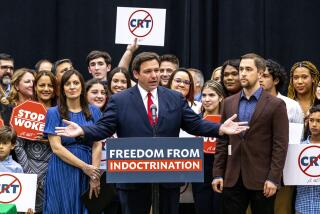Progressive Education and School Violence
- Share via
Re “Socializing Students for Anarchy,” by Glenn Woiceshyn, Column Right, Feb. 18:
I’m afraid the problem is not so much John Dewey as it is Plato. We want so much to believe that truth and knowledge equate with goodness and virtue. Unfortunately it’s not quite that simple, and I regret Woiceshyn’s use of a column to bash teachers and public education.
Over the years since the 1950s, most of my high school students have gone on to successful and rewarding lives--some of them to prominent success. But not all. I remember an older teacher telling me very seriously when I began teaching: “Never visit a state prison. If you do, someone will call your name from one of the cells asking if you remember them.” I have no idea how many of my students are doing time. I have heard of three--one a lifer.
As I was reading Woiceshyn’s article, I stopped to listen to a TV report from Ruby Bridges Hall, who, as a 6-year-old, began the integration of the New Orleans public schools. Against the backdrop of unreasoned hate this little girl experienced and against my own lifetime of teaching, Woiceshyn’s statement that “the only way to stop students from acting like animals is to regard them as thinking human beings” rings very hollow.
JAMES CASSIDY
Glendora
Woiceshyn’s diatribe against scholastic irrationality is itself irrational. He provides no evidence of his case except one quote from a teacher. Woiceshyn points to John Dewey as the first to champion the socialization of children, which Woiceshyn considers the root of all evil. He neglects to mention, however, that Dewey first advocated progressive schooling at the turn of the century--the 20th century, not the 21st. If Dewey’s philosophy was so wrongheaded, why haven’t we had a century of bad schools? Why have they deteriorated only recently?
Woiceshyn vaguely hints that human secularists, moral relativists and other fuzzy-headed liberals are to blame. They gave us “new math” and “free schools” in the ‘60s, after all. But we just as easily could point to the strong conservative tide, the rise in religious fundamentalism, or the hypocritical cries for “values” in the last few decades. It’s called correlation, not causation, and Woiceshyn doesn’t seem to know the difference.
ROBERT SCHMIDT
Culver City






